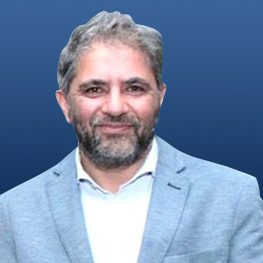President’s Message
Prof. (Dr) Rakesh Jalali
President, Immuno-Oncology Society of India (I-OSI)
Medical Director, Apollo Proton Cancer Centre (APCC)
Professor and Head, Radiation Oncology, APCC
Lead, Neuro-Oncology Cancer Management Team

Dear I-OSI Members,
Over the past decade, immuno-oncology has revolutionised the landscape of cancer treatment, shifting from experimental promise to clinical reality across tumour types. Immune checkpoint inhibitors, cancer vaccines, cell-based therapies, and radiation-immunotherapy combinations have redefined survival and quality-of-life outcomes, offering new hope to patients worldwide.
India, with its sheer volume of cancer patients and rich clinical diversity, holds immense potential to contribute to global immuno-oncology knowledge. However, solutions must be adapted to our context, where affordability, access, and health system readiness are critical. The I-OSI strongly believes that immunotherapy must be tailored, accessible, and equitably delivered across our population.
The burgeoning field of biosimilars and locally manufactured immuno-oncology drugs, including checkpoint inhibitors and CAR-T platforms, offers an unprecedented opportunity to democratise access. Encouraging indigenous R&D and commercial scale-up of these innovations will be key to sustainability.
I-OSI was established with a clear mandate to bridge the gap between basic science and bedside application by fostering collaboration among clinicians, scientists, and industry stakeholders. We are committed to building capacity, accelerating bench-to-bedside research, and enabling equitable access to immuno-oncology innovations across India and low- and middle-income countries (LMICs).
Our trajectory must now be powered by strategic and judicious collaborations with global academic forums, industry leaders, and philanthropic organisations, underpinned by rigorous, prospective, Indian-origin data. Without local evidence, precision immuno-oncology will remain aspirational rather than actionable.
Our immediate priorities include:
- Pushing multidisciplinary care across all oncology domains, surgery, radiation, conventional systemic therapies—into an integrated, combinatorial approach grounded in the principles of precision immuno-oncology.
- Establishing Indian guidelines for immunotherapy integration, including combinations with radiation and targeted therapies.
- Strengthening predictive biomarker research and understanding immune resistance, hyperprogression, and immune-related adverse events.
- Encouraging early-phase immuno-oncology clinical trials within the country to generate indigenous, practice-informing data.
- Training the next generation of clinician-scientists through symposia, workshops, and mentorship programs.
From its inception, IOSI has been uniquely inclusive, giving voice and visibility to basic and translational scientists. This continues to be one of our key differentiators. Fostering institutional linkages, enabling early-career researcher development, and creating a vibrant scientific ecosystem is central to our mission.
It is an honour to serve as President at such a transformative juncture. I-OSI’s journey has been deeply inspired and supported by global leaders, including Nobel Laureate Prof. James Allison, whose encouragement reaffirms our direction and galvanises our ambition. Such international endorsements must now be harnessed to propel India’s leadership in immuno-oncology forward.
It is also time for us to find and strengthen our own voice. We must invest in impactful publications, consensus documents, and perhaps even an official I-OSI journal in the near future to reflect and shape the narrative of immuno-oncology in the Global South.
At IOSI, we envision India not just as a consumer of global science but as a producer of immuno-oncology evidence and innovation, tailored to its unique biology, genetics, and public health realities. We welcome contributions from every member of the community, including early-career professionals, who will be the torchbearers of this movement.
I invite each of you to participate actively through our academic meetings, consensus-building initiatives, journal clubs, and advocacy platforms. Together, we can ensure that India becomes a global leader in equitable, evidence-driven cancer immunotherapy.
With warm personal regards
Rakesh Jalali
President, Immuno-Oncology Society Of India
